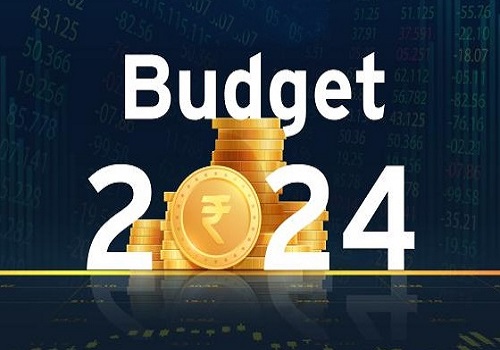India Strategy : Union Budget 2024-25 by Yes Securities Ltd

Fiscal Prudence Dovetails Tax Reforms
Despite the setback for equity investors due to changes in capital gains tax, the Union Budget 2025 is balanced and consistent in policy, while also paving the way for ongoing reforms in the tax regime. Addressing concerns about populism, the fiscal deficit target of 4.9% underscores a strong commitment to fiscal responsibility. The government has introduced various schemes to support the poor, women, youth employment, and farmers, yet the overall budgeted expenditure, including subsidies, remains largely unchanged from the Interim Budget. However, the government is steadfast in its commitment to capital expenditure, maintaining it as a percentage of GDP. Meanwhile, receipts are driven by the windfall from RBI dividends. The rationalization of personal income tax slabs is a positive step to boost consumption. Clearly, the government's broader goal is to simplify and rationalize tax structures, with further reforms anticipated in future budgets.
* No Meaningful Change in Budgeted Receipts and Expenditure: The budgeted numbers for gross tax revenues and receipts have shown no significant variation from the Interim Budget. The budgeted number for gross tax revenues stands at Rs.38.4 trillion, which is largely the same when compared with the Interim Budget number of Rs.38.3 trillion. Similarly, the total expenditure at Rs.48.2 trillion do not vary much from the Interim figure of Rs.47.7 trillion.
* RBI Dividends - The Major Variable: Windfall RBI dividends have dramatically changed the fiscal equation. The substantial rise in net income enabled the RBI to declare a record dividend payout of Rs.2.1 trillion to the government for FY24. This was double the government’s budget estimate of Rs.1 trillion and much larger than the Rs.87,416-crore dividend payout in FY23. This massive dividend payout is expected to help the Centre achieve its fiscal deficit target of 4.9% of GDP for FY25. The dividend, paid in May 2024, is accounted for in FY25 by the government.
* India's Sovereign Yield Curve to Bull Steepen on Better Fiscal Math: On May 29, 2024, we wrote that yields on the short end of the curve will fall more than the long end in the months ahead, leading to a bull steepening of India’s yield curve. India’s macroeconomic health entails a bull steepening of the yield curve, wherein short-term yields will fall faster than long-term yields. This steepening is driven by expectations of steady economic growth, falling inflation, and improving fiscal deficit. Better budgetary health due to higher tax revenues and dividends is reflected in reduced government market borrowing needs. The fiscal roadmap with a 4.5% target for FY26 will not necessitate an immediate change in credit ratings. However, various rating agencies have stated that a budgetary shortfall below 4% will warrant an upgrade in ratings.
* End to Tax Arbitrage between Dividend Distribution and Buyback of Shares: This is deemed to be slightly negative for Investors and Promoters of Cash-rich enterprises.
* Minimal Impact of Removal of Indexation Benefit on Real Estate: The abolition of the indexation benefit will not significantly affect the overall real estate sector, as it coincides with a reduction in long-term capital gains tax from 20% to 12.5%. Old properties held before 2001 would continue to get indexation benefits. Moreover, substantial reduction in LTCG will dissuade black money deals in terms of underreporting of Real Estate price.
* Import Duty Cut on Gold to curb smuggling: Reduction of 9% in import duty on Gold will help in curbing smuggling of the Bullion. This can bring a significant part of the gold imports back into the official channel. Meanwhile, we see the Government increasing GST rates on Gold to partially compensate for the loss to the exchequer in terms of cut in the import duty. Fall in Import Duty can also marginally mitigate the debt obligation of the Government, pertinent to Sovereign Gold Bonds.
* Rationalization and Simplification of Tax Regime to Continue: The finance minister alluded to a comprehensive review of the Income Tax Act to simplify taxation and reduce disputes, as well as a customs duty rate structure overhaul to correct inverted duty structures. This indicates that reforms on the taxation front will be an ongoing process, with further measures to be taken in future budgets to rationalize and simplify the tax regime.
Please refer disclaimer at https://yesinvest.in/privacy_policy_disclaimers
SEBI Registration number is INZ000185632























